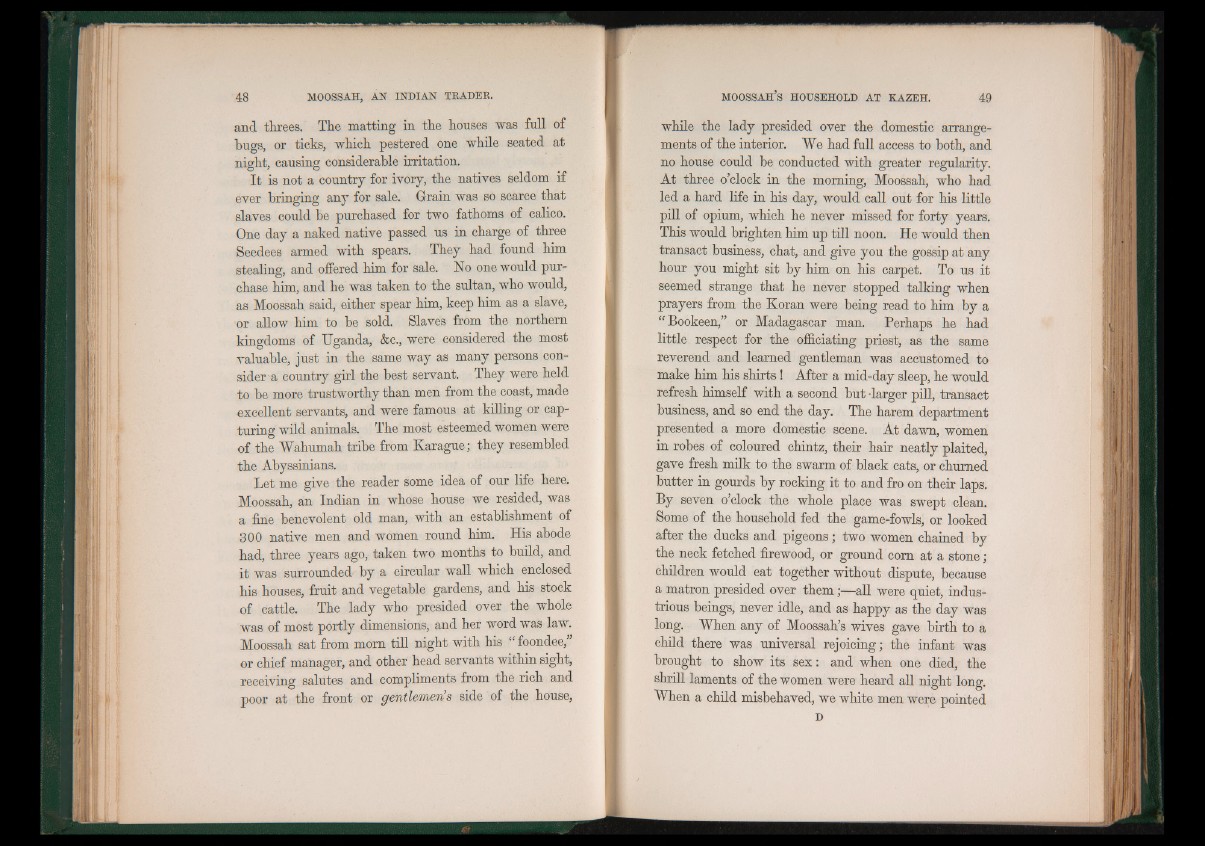
and threes. The matting in the houses was full of
bugs, or ticks, which pestered one while seated at
night,O ? causinOg considerable irritation.
It is not a country for ivory, the natives seldom if
ever bringing any for sale. Grain was so scarce that
slaves could be purchased for two fathoms of calico.
One day a naked native passed us in charge of three
Seedees armed with spears. They had found him
stealing, and offered him for sale. No one would purchase
him, and he was taken to the sultan, who would,
as Moossah said, either spear him, keep him as a slave,
or allow him to be sold. Slaves from the northern
kingdoms of Uganda, &c., were considered the most
valuable, just in the same way as many persons consider
a country girl the best servant. They were held
to be more trustworthy than men from the coast, made
excellent servants, and were famous at killing or capturing
wild animals. The most esteemed women were
of the Wahumah tribe from Karague; they resembled
the Abyssinians.
Let me give the reader some idea of our life here.
Moossah, an Indian in whose house we resided, was
a fine benevolent old man, with an establishment of
300 native men and women round him. His abode
had, three years ago, taken two months to build, and
it was surrounded by a circular wall which enclosed
his houses, fruit and vegetable gardens, and his stock
of cattle. The lady who presided over the whole
was of most portly dimensions, and her word was law.
Moossah sat from mom till night with his “ foondee,”
or chief manager, and other head servants within sight,
receiving salutes and compliments from the rich and
poor at the front or gentlemen’s side of the house,
while the lady presided over the domestic arrangements
of the interior. We had full access to both, and
no house could be conducted with greater regularity.
At three o’clock in the morning, Moossah, who had
led a hard life in his day, would call out for his little
pill of opium, which he never missed for forty years.
This would brighten him up till noon. He would then
transact business, chat, and give you the gossip at any
hour you might sit by him on his carpet. To us it
seemed strange that he never stopped talking when
prayers from the Koran were being read to him by a
“ Bookeen,” or Madagascar man. Perhaps he had
little respect for the officiating priest, as the same
reverend and learned gentleman was accustomed to
make him his shirts ! After a mid-day sleep, he would
refresh himself with a second but darger pill, transact
business, and so end the day. The harem department
presented a more domestic scene. At dawn, women
in robes of coloured chintz, their hair neatly plaited,
gave fresh milk to the swarm of black cats, or churned
butter in gourds by rocking it to and fro on their laps.
By seven o’clock the whole place was swept clean.
Some of the household fed the game-fowls, or looked
after the ducks and pigeons; two women chained by
the neck fetched firewood, or ground com at a stone ;
children would eat together without dispute, because
a matron presided over them;—all were quiet, industrious
beings, never idle, and as happy as the day was
long. When any of Moossah’s wives gave birth to a
child there was universal rejoicing; the infant was
brought to show its sex: and when one died, the
shrill laments of the women were heard all night long.
When a child misbehaved, we white men were pointed